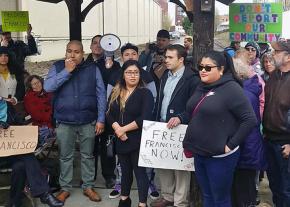Freeing a Portland Dreamer
Immigration and Customs Enforcement is targeting Dreamers, but in Portland, Oregon, supporters of immigrant rights are ready to respond, reports .
TWENTY-FOUR hours after Immigration and Customs Enforcement (ICE) agents detained Francisco Rodriguez Dominguez in Portland, Oregon, the 25-year-old Dreamer was freed on bond as a result of an outpouring of solidarity and protest.
More than 200 protesters crowded around ICE headquarters in southwest Portland on March 27 to demand Rodriguez Dominguez's release.
"The phone lines were jammed up all day yesterday and today," said Mat dos Santos, legal director at the ACLU of Oregon. "Yet again, people have shown that they reject the cruel policies of the Trump administration."
Rodriguez Dominguez was the third person with Deferred Action for Childhood Arrival (DACA) status--the Obama administration policy that allows immigrants who arrived in the U.S. as children a reprieve from deportation--to be picked up in Portland over the weekend.
Although they aren't the first Dreamers that ICE has detained under the Trump administration--there were high-profile arrests in Seattle and Jackson, Mississippi, last month--the Portland Dreamers are the largest number picked up in one metro area so far, according to the Willamette Week.

"ICE raids are not new to immigrant communities. There is a reason why Obama was called the Deporter-in-Chief," said protester Gisela Rodriguez Fernandez, a Bolivian immigrant and member of the International Socialist Organization. "However, the current policies of President Trump and his xenophobic rhetoric have exacerbated fear and anxiety among immigrants. And we are seeing an increasing targeting of immigrant activists and sanctuary cities by ICE."
"It's an intimidation tactic," said Romeo Sosa, director of the Portland VOZ Workers Rights Education Project, which runs a day labor center. By making its agents visible on the streets, ICE hopes "people will be afraid, and they'll pack stuff and leave the country," Sosa said.
Day laborers, many of them undocumented immigrants, are currently in negotiations with the Portland Development Commission (PDC) for a long-term lease for their center. VOZ has organized several mass actions to pressure the PDC.
Immigrant carpenters, many of whom work on the huge downtown buildings dotting Portland's skyline, are also organizing for union rights, better pay and working conditions. ICE arrests intimidate workers and undercut organizing, keeping wages and benefits low for all.
RODRIGUEZ DOMINGUEZ has been in the U.S. since he was 5 years old. He attended Portland public schools, including community college, and he's a food bank and church volunteer and soccer coach, as well as a Latino Network activist.
He "was targeted for arrest based upon his guilty plea in December to a charge of driving under the influence of intoxicants, an offense ICE deems a threat to public safety," according to ICE spokeswoman, Rose Richeson. Rodriguez Dominguez had almost completed a court-ordered diversion program.
Although the Portland City Council voted this month to declare itself a "sanctuary city," there is not much they will do to interfere with ICE activities. "The city had no role in this arrest, and I am against it," said Mayor Ted Wheeler. "However, ICE has the power to operate within our city, and does not have to inform us of their activities."
City officials have taken actions, from creating a training program for city employees to providing $50,000 toward the legal defense of immigrants' cases. But activists argue the city could go further--by making fewer arrests for low-level offenses and by ending racial profiling of Brown and Black people, for instance.
Portland has a rich network of immigrant defense organizations, from the Interfaith Movement for Immigrant Justice, to the Portland Immigrant Rights Coalition and Jobs with Justice. All of them have rapid response methods, from e-mail to text, to phone calls and word of mouth.
Signs and slogans at the ICE rally revealed church contingents, student, union and anti-racist activists, as well as large groups mobilized by the Portland Women's March.
Portland has been an epicenter of resistance to the Trump agenda, from its massive street demonstrations in the first days after November's election to the largest demonstration in the city's history--the Portland Women's March--to uprisings at the airport against Trump's Muslim ban.
The future, while perilous, promises an increased knitting together of labor, student, faith and neighborhood networks of resistance. Further plans to defend Portland's immigrants are afoot--for mass civil disobedience actions against ICE and for strikes on May Day.
"We remain resilient and we continue to organize against this system that makes us scapegoats," declared Gisela Rodriguez Fernandez. "The release of Francisco Rodriguez Dominguez was possible because people came in solidarity to demand his release. This shows us that change is possible, but only if people organize."


